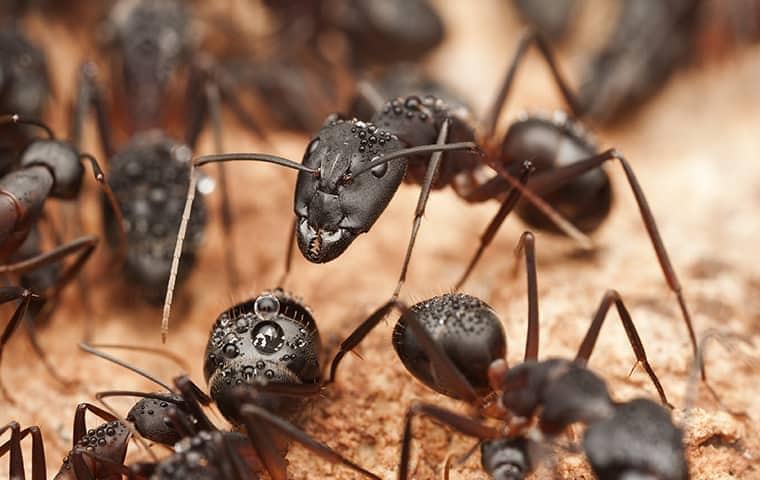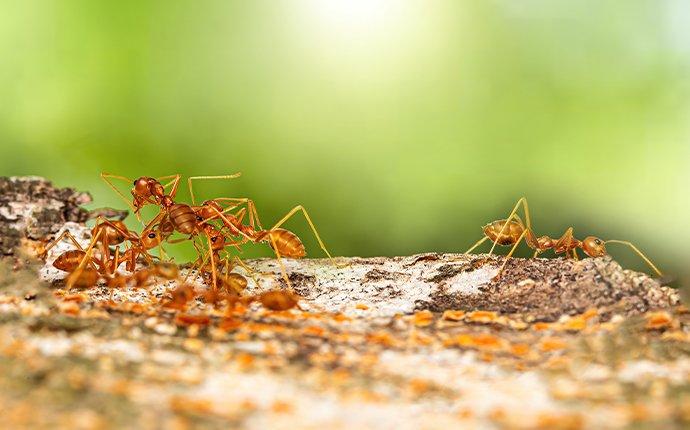Top Ant Control Services: Reliable Solutions for Your Home or Company
Top Ant Control Services: Reliable Solutions for Your Home or Company
Blog Article
Environmental Impact of Bug Control: Harmonizing Efficiency With Sustainability
The environmental impact of bug control is an important concern that needs a fragile equilibrium between achieving performance in ensuring and handling parasites sustainability of our ecosystems. As we strive to secure our plants, homes, and health and wellness from the risks presented by parasites, the approaches we employ can accidentally harm the environment. From using damaging chemicals that permeate into our soil and water to the unexpected repercussions on non-target species, the consequences of traditional insect control practices are significant. Nevertheless, there are arising strategies that provide wish for a more sustainable technique to pest administration. These options not just purpose to attend to the prompt insect issues yet also consider the lasting health of our planet.
Dangerous Chemicals in Bug Control
The application of dangerous chemicals in parasite control postures substantial ecological and wellness threats that warrant mindful factor to consider and reduction approaches. Chemicals, herbicides, and pesticides are frequently used to get rid of pests, yet their prevalent application can cause unexpected repercussions. These chemicals can contaminate dirt, water resources, and the air, impacting not only the targeted insects however additionally valuable pests, wildlife, and humans.

To attend to these dangers, integrated insect administration (IPM) methods are being advertised as an extra lasting choice. IPM includes a combination of methods such as organic control, environment control, and the targeted use of pesticides as a last resource (ant control conover nc). By adopting a holistic strategy to pest control, we can lessen the environmental and health influences connected with harmful chemicals while properly handling pest populations
Influence on Non-Target Types
Taking into consideration the unplanned repercussions of pest control methods, the effect on non-target varieties is a vital aspect that calls for complete assessment. While parasite control steps intend to target details bugs, various other organisms in the ecological community may be accidentally impacted. Non-target species, consisting of advantageous pests, birds, mammals, and also plants, can endure straight or indirect damage from chemical applications or organic control methods.
Chemicals can have sub-lethal or dangerous effects on non-target types. Insecticides created to combat a specific bug pest may hurt pollinators like or all-natural killers such as ladybugs. Furthermore, chemical deposits can gather in the environment, impacting non-target microorganisms with time. Biological control agents, if not species-specific, can present threats to unplanned targets, interfering with the ecological balance.
To reduce the effect on non-target types, integrated insect management (IPM) techniques that emphasize an alternative approach to pest control are recommended. These methods focus on making use of environmentally pleasant techniques, reducing damage to valuable microorganisms while effectively managing pest populations. Performing thorough danger analyses and keeping track of the results of pest control initiatives are essential action in securing non-target varieties and advertising overall community wellness.
Soil and Water Contamination
Unplanned environmental repercussions of parasite control approaches prolong past impacting non-target species, with considerable effects for dirt and water contamination - ant control. Pesticides, herbicides, and chemical fertilizers utilized in parasite control can leach into the soil and pollute groundwater, posturing a threat to both water and terrestrial environments.
Water contamination is another vital problem linked with parasite control practices. Drainage from agricultural fields treated with pesticides can carry these chemicals into nearby water bodies, affecting aquatic organisms and water quality. Contaminants in water sources can have significant repercussions, affecting not only aquatic life but also human health through the consumption of infected water or aquatic microorganisms. To minimize dirt and water contamination from parasite control tasks, incorporated insect administration techniques that prioritize sustainability and reduce chemical inputs are vital.
Air Air Pollution From Pesticide Usage
Direct exposure to airborne chemicals throughout agricultural applications positions a significant problem for air contamination control steps. They can volatilize right into the air and kind unstable organic substances (VOCs) and various other airborne contaminants when pesticides are splashed onto crops - termite control. These chemicals can add to the development of ground-level ozone, a major part of smog that can have detrimental results on human health, plant productivity, and total air quality. Additionally, chemical drift, where pesticides are brought by the wind to unintended locations, can lead to the contamination of neighboring communities and water bodies.

Techniques for Lasting Insect Control
In the realm of agricultural practices, carrying out lasting bug control methods is paramount for keeping ecological balance and visit this website protecting crop yields. Lasting insect control emphasizes making use of eco-friendly techniques to handle parasite populations successfully while minimizing harm to non-target organisms and environments. Integrated Bug Administration (IPM) is a commonly taken on technique that integrates organic, cultural, physical, and chemical control techniques to achieve long-term bug monitoring solutions.
Crop rotation and diversity are likewise effective strategies to disrupt pest life cycles and develop less desirable conditions for pests to prosper. Ultimately, by incorporating these lasting pest control strategies, farmers can achieve an equilibrium between pest monitoring effectiveness and ecological stewardship.
Final Thought
In conclusion, the ecological influence of insect control approaches must be meticulously considered to stabilize effectiveness with sustainability. Unsafe chemicals utilized in bug control can lead to soil and water contamination, air contamination, and injury non-target species - termite control. It is essential to carry out lasting pest control techniques to lessen these unfavorable results on the environment and promote a healthier environment for future generations
By taking on an all natural approach to pest control, we can reduce the environmental and health influences linked with hazardous chemicals while successfully handling pest populaces.

To alleviate the air pollution created by pesticide use, it is important to take on integrated bug monitoring techniques that focus on the usage of non-chemical parasite control methods, such as plant turning, natural predators, and immune plant varieties. Lasting parasite control highlights the usage of ecologically pleasant methods to handle bug populations successfully while minimizing damage to non-target microorganisms and ecological communities. Integrated Insect Administration (IPM) is an extensively adopted method that integrates biological, social, physical, and chemical control approaches to attain long-term insect administration options.
Report this page